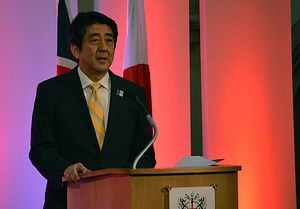Japan appears to be gearing up to make another public push for the right to assert itself militarily, and make larger contributions to regional security. Prime Minister Shinzo Abe’s statements before the Diet Wednesday, and an expected keynote speech at the Shangri-La Dialogue on Friday, frame the direction he intends to take on these matters.
Speaking to the Diet, Abe described China’s increased military spending and its “extremely dangerous” recent actions in the East China Sea as necessitating his push for a change in the role of Japan’s Self-Defense Forces (SDF), according to Bloomberg. “Under these circumstances, to protect the lives of the Japanese people, we must further strengthen the Japan-U.S. alliance. The world security environment is changing a great deal. Now, no one country can defend itself alone.”
While responding to questions from the Diet, he said the near mid-air collision of Chinese and Japanese aircraft on May 24 inside China’s disputed Air Defense Identification Zone (ADIZ) could lead to unintended consequences. Abe is seeking to strengthen the ruling LDP’s stance on changing Article 9 of Japan’s pacifist constitution while it is undergoing discussions with its coalition partner New Komeito, in order to create a unified position to put before the Diet later this year.
In addition to his domestic comments, Abe was expected to discuss regional security issues, and Japan’s role within that framework, during his address in Singapore on Friday at the International Institute for Strategic Studies (IISS) Asia Security Summit. Prior to the meeting, Abe said on Thursday that “Tensions are rising in the Asia-Pacific. I want to send a message to the world about Japan’s pro-active contribution to peace based on international cooperation,” according to Kyodo News.
Countries such as Vietnam and the Philippines, which have had recent security flare-ups with China, will be receptive to Japan’s expected statements concerning the enforcement of internationally established laws (a clear reference to China’s maritime disputes in the South China Sea), and an expanded Japanese role in regional security. Reuters quoted a senior Philippine defense official on Thursday as saying, “We welcome Japan’s contribution to the enhancement of security and stability in the region, including its plan to play a larger security role in the region.”
China is sending Wang Guanzhong, deputy chief of general staff of the Chinese People’s Liberation Army, as lead delegate to the summit. He is expected to expound on President Xi Jinping’s new security concept, and to make proposals on stepping up regional security collaboration. According to BBC News, he is also likely to describe Tokyo, not Beijing, as the region’s largest security threat.
Japanese Chief Cabinet Secretary Yoshihide Suga said Abe would call for “constructive discussions… towards [Asia’s] peace and safety,” due to “heightening situations in the South China Sea and the East China Sea.” The U.S. Secretary of Defense, Chuck Hagel, said he would raise issues at the summit where China is upsetting the regional status quo.
To underscore the recent change in momentum away from China in the region, Japanese officials on Wednesday said the country is considering selling submarine technology, and perhaps a fully engineered fleet, to Australia. The potential deal is expected to be discussed when the two countries’ foreign and defense ministers meet in Tokyo next month. According to Reuters, Japanese officials have said if they can reach a “framework agreement on security policy with Canberra that would lock future Australian governments into an alliance with Japan,” then Japan would consider supplying them with a complete version of its Soryu-class submarine.
Another example of Japan’s increasing military interaction in the region is its agreement with Myanmar this week to enhance defense cooperation. While the specifics of the meeting between the countries’ top two military officials haven’t been disclosed, they agreed on “the importance of exchanges at every level between the Self-Defense Forces and Myanmar Armed Forces.”
Japan’s attempts to counterbalance China in Southeast Asia certainly aren’t new. However, China’s assertiveness in the South China Sea is making Japanese involvement in the region more attractive to states like Vietnam and the Philippines. China will continue to draw attention to Japan’s attempts to change its Constitution and empower its military. However, the regional response to Japan’s actions will likely be muted so long as China viewed as the more antagonistic power in Southeast Asia.

































